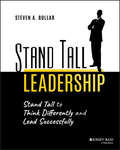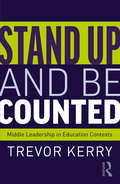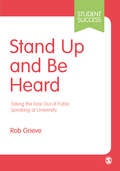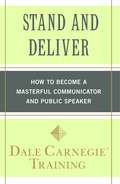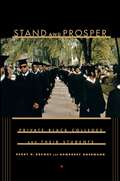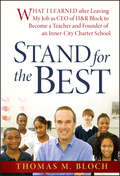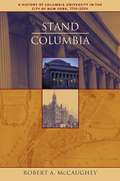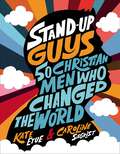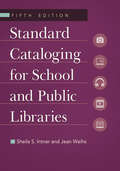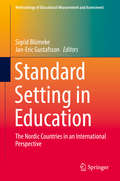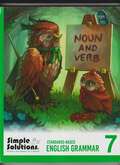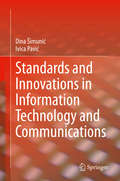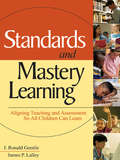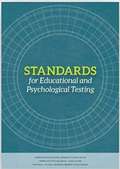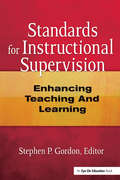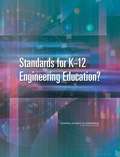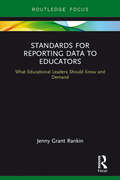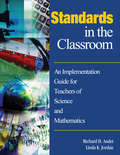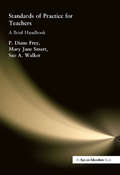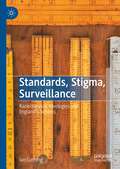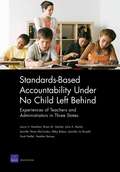- Table View
- List View
Stand Tall Leadership: Stand Tall to Think Differently and Lead Successfully
by Steven A. BollarStand out like you&’re 7 feet tall — how to think and act differently as a K-12 leader Tall people stand out in a crowd. Tall people think and act differently: people like author Steven Bollar. He has spent his career as a principal and administrator creating school cultures that make students excited to learn and achieve their goals. In Stand Tall Leadership, Steven shows you that it doesn't matter what your natural height really is—you can stand tall in everything you do by thinking and acting differently from those around you. Designed for K-12 leaders, this unique and engaging book helps you overcome challenges in your school, manage effectively, inspire your staff, build strong relationships, communicate clearly, and much more. The Stand Tall Leadership philosophy is all about creating the best possible environment at your school. Strong leadership skills are essential for making better decisions, maintaining your focus and priority, and maximizing outcomes with students, staff, parents, and the entire community. The principles and techniques in this book will strengthen your own leadership skills and assist you in developing effective leaders within your school. Providing hands-on tools and real-world guidance, this valuable resource will help you: Connect with staff, understand their needs, and set them up for success Keep your best employees and leaders right where they are, not chasing other opportunities Assessyour leadership skills and make immediate, meaningful improvements Maintain focus in any situation to increase productivity and get outstanding results Repair damaged relationships that slow down progress and impede success Stand Tall Leadership: Stand Tall to Think Differently and Lead Successfully is a must-read for all K-12 leaders and administrators, as well as K-12 educators looking to develop their leadership skills.
Stand Up and Be Counted: Middle Leadership In Education Contexts
by Trevor KerryStand Up and Be Counted provides middle leaders with increased knowledge, understanding and confidence in the leadership process. It examines the qualities that enable middle leaders to lead effectively and have a positive impact on the vision and culture of their school. With clear explanations of leadership theory, chapters cover a wide range of topics such as recuitment, coaching staff, crisis management, teamwork, setting standards, dealing with inspections, and evaluating both your own and staff performance. Full of real examples of leadership situations in schools and opportunities to reflect, this book will help middle leaders to develop the habits and skills they need to be successful in their roles. This inspirational and conceptual book: acknowledges the essentials of leadership and decision-making; highlights how teachers become leaders, including the initial status of followership; discusses the good habits and skills that teachers can adopt to prepare themselves for leadership roles; identifies key concepts for middle leaders such as vision, inspiration, courage, and self-belief; addresses the need to be a visionary and lead from the front: to be courageous. Covering all aspects of leadership and using examples from various of walks of life to illuminate the role of a leader, this book will be of great interest to middle leaders across the primary and secondary sectors as well as subject leaders looking to increase their knowledge and confidence in their development.
Stand Up and Be Heard: Taking the Fear Out of Public Speaking at University (Student Success)
by Dr. Rob GrievePublic speaking is an integral skill not only in study but in life, yet giving presentations, oral assessments, or even talking in groups is a terrifying prospect for many students. This book is filled with tips and tricks cultivated through Rob Grieve&’s experience in running public speaking workshops at university. Taking the fear out of public speaking at university, he teaches you how to develop your public speaking skills and build your confidence; so whether you&’re giving a presentation or just talking with friends you can face the situation without fear. With a unique focus on &‘authenticity&’ over perfection, Stand Up and be Heard: Helps you identify and understanding your fear; what is it that you are most afraid of? How does this fear manifest Provides practical exercises and strategies that will help you manage your fear Teaches you the benefits of &‘authentic&’ speaking and relying on your own voice and personality Offers checklists, step-by-step guidance and student testimonials to support your growth. The Student Success series are essential guides for students of all levels. From how to think critically and write great essays to planning your dream career, the Student Success series helps you study smarter and get the best from your time at university. Visit the SAGE Study Skills hub for tips and resources for study success!
Stand Up and Be Heard: Taking the Fear Out of Public Speaking at University (Student Success)
by Dr. Rob GrievePublic speaking is an integral skill not only in study but in life, yet giving presentations, oral assessments, or even talking in groups is a terrifying prospect for many students. This book is filled with tips and tricks cultivated through Rob Grieve&’s experience in running public speaking workshops at university. Taking the fear out of public speaking at university, he teaches you how to develop your public speaking skills and build your confidence; so whether you&’re giving a presentation or just talking with friends you can face the situation without fear. With a unique focus on &‘authenticity&’ over perfection, Stand Up and be Heard: Helps you identify and understanding your fear; what is it that you are most afraid of? How does this fear manifest Provides practical exercises and strategies that will help you manage your fear Teaches you the benefits of &‘authentic&’ speaking and relying on your own voice and personality Offers checklists, step-by-step guidance and student testimonials to support your growth. The Student Success series are essential guides for students of all levels. From how to think critically and write great essays to planning your dream career, the Student Success series helps you study smarter and get the best from your time at university. Visit the SAGE Study Skills hub for tips and resources for study success!
Stand and Deliver
by Dale Carnegie TrainingBECOME THE GREAT COMMUNICATOR YOU'VE ALWAYS WANTED TO BE!We all know a great public speaker when we see one. He or she seems to possess qualities--confidence, charisma, eloquence, learning--that the rest of us lack. But the ability to speak well in front of others is a skill, not a gift. That means anyone can learn how to do it with the right guidance. Stand and Deliver gives you everything you need to know to become a poised, polished, and masterful communicator. It reveals the techniques that have worked for countless great speakers throughout history. In this book you will learn how to prepare properly for a presentation, develop and project your own unique style, overcome stage fright, and win any audience in one minute. Packed with tips, strategies, and real-life examples, including case studies of some of the world's great orators, Stand and Deliver is the definitive guidebook for public speaking. The essential techniques that you learn from this book will benefit you for years to come.
Stand and Prosper: Private Black Colleges and Their Students
by Henry N. Drewry Humphrey DoermannStand and Prosper is the first authoritative history in decades of black colleges and universities in America. It tells the story of educational institutions that offered, and continue to offer, African Americans a unique opportunity to transcend the legacy of slavery while also bearing its burden. Henry Drewry and Humphrey Doermann present an up-to-date and comprehensive assessment of their past, present, and possible future. Black colleges fully got off the ground only after the Civil War--more than two centuries after higher education formally began in British North America. Despite horrendous obstacles, they survived and even proliferated until well past the mid-twentieth century. As the authors show, however, the 1954 U.S. Supreme Court ruling in Brown v. Board of Education brought them to a crucial juncture. While validating the rights of blacks to pursue opportunities outside racial and class lines, it drew the future of these institutions into doubt. By the mid-1970s black colleges competed with other colleges for black students--a welcome expansion of choices for African-American youth but a huge recruitment challenge for black colleges. The book gradually narrows its focus from a general history to a look at the development of forty-five private black colleges in recent decades. It describes their varied responses to the changes of the last half-century and documents their influence in the development of the black middle class. The authors underscore the vital importance of government in supporting these institutions, from the Freedman's Bureau during Reconstruction to federal aid in our own time. Stand and Prosper offers a fascinating portrait of the distinctive place black colleges and universities have occupied in American history as crucibles of black culture, and of the formidable obstacles they must surmount if they are to continue fulfilling this important role.
Stand for the Best
by Thomas M. BlochThirteen years ago, Tom Bloch was CEO of H&R Block, the groundbreaking tax organization. The son of the company's founder, he was a happily married 41-year-old executive, but something was missing from his life. After a nineteen-year career at the company, Bloch resigned his position to become a math teacher in an impoverished inner-city section of Kansas City. Stand for the Best reveals Bloch's struggles to make a difference for his marginalized students and how he eventually co-founded a successful charter school, University Academy.
Stand, Columbia: A History of Columbia University (Columbiana)
by Robert McCaugheyStand, Columbia! Alma MaterThrough the storms of Time abideStand, Columbia! Alma MaterThrough the storms of Time abide."Stand, Columbia!" by Gilbert Oakley Ward, Columbia College 1902 (1904)Marking the 250th anniversary of one of America's oldest and most formidable educational institutions, this comprehensive history of Columbia University extends from the earliest discussions in 1704 about New York City being "a fit Place for a colledge" to the recent inauguration of president Lee Bollinger, the nineteenth, on Morningside Heights. One of the original "Colonial Nine" schools, Columbia's distinctive history has been intertwined with the history of New York City. Located first in lower Manhattan, then in midtown, and now in Morningside Heights, Columbia's national and international stature have been inextricably identified with its urban setting.Columbia was the first of America's "multiversities," moving beyond its original character as a college dedicated to undergraduate instruction to offer a comprehensive program in professional and graduate studies. Medicine, law, architecture, and journalism have all looked to the graduates and faculty of Columbia's schools to provide for their ongoing leadership and vitality. In 2003, a sampling of Columbia alumni include one member of the United States Supreme Court, three United States senators, three congressmen, three governors (New York, New Jersey, and California), a chief justice of the New York Court of Appeals, and a president of the New York City Board of Education. But it is perhaps as a contributor of ideas and voices to the broad discourse of American intellectual life that Columbia has most distinguished itself. From The Federalist Papers, written by Columbians John Jay and Alexander Hamilton, to Charles Beard's An Economic Interpretation of the Constitution and Jack Kerouac's On the Road to Edward Said's Orientalism, Columbia and its graduates have greatly influenced American intellectual and public life. Stand, Columbia also examines the experiences of immigrants, women, Jews, African Americans, and other groups as it takes critical measure of the University's efforts to become more inclusive and more reflective of the diverse city that it calls home.
Stand-Up Guys: 50 Christian Men Who Changed the World
by Kate Etue Caroline SiegristStand-Up Guys presents a diverse range of 50 Christian men, who saw social and world issues and decided to make their voices heard. Through biographical information paired with illustrations, readers 8 to 12 will encounter amazing and unique role models from both history and today that show they can follow any path to help change the world.We can all make a difference, and as the 50 men featured inside Stand-up Guys show, it doesn&’t matter who you are or where you live as long as your follow your passions and stay strong in your faith. From feeding the hungry following natural disasters to highlighting social injustice to speaking up about climate change, oppression, and more, these people from around the world—both in the past and in the present—from a variety of backgrounds provide positive examples of what you can accomplish if you just dare to stand up.Included inside these pages are men such as:Chef José Andrés, founder of World Central KitchenBryan Stevenson of the Equal Justice Initiative, and focus of the movie Just MercyCongressman and Civil Rights leader John LewisOlympian Eric LiddellLegendary surfer Eddie AikauSaint Francis&“Kid President&” Robby NovakAnd moreAnd with a colorful interior with engaging full-page illustrations, easy-to-read one-page biographies of each person, and a list of additional resources at the back, kids can explore a variety of role models and discover the path they want to take themselves as they put their faith into action.Stand-Up Guys is also ideal as:A Christmas gift or Easter basket presentA resource for at-home learning, introducing your child to people across history as well as modern-day history-makersInspiration for boys and young men, helping them see the full range of what being a &“man&” truly is
Standard Cataloging for School and Public Libraries
by Jean Weihs Sheila S. IntnerA proven resource for librarians and students, this updated classic opens the door to understanding current library cataloging processes, shows you how to use them to create standard catalog records, and provides guidance in managing the cataloging workflow. Library cataloging and classification tools are constantly improving, making this concise guide a necessity for any librarian or library student seeking improved understanding of the practical process of cataloging today. With the release of RDA, a new code for description, and a new edition of Dewey Classification, it's time for every library to add this fifth edition of a classic reference to your resources. Two Margaret Mann Citation winners update you on the five basic steps in standardized library cataloging: describing and adding access points for resources; assigning subject headings using Sears List or Library of Congress subject headings; classifying them using the Dewey Decimal or Library of Congress classification systems; and digitizing the resulting records. The book opens with a brief look at the environment in which cataloging now functions, especially in response to advances in digital access. It clarifies terminology, explores new and changed applications, and enhances understanding of basic principles for those responsible for creating cataloging data. To get you ready for tomorrow, the edition closes with a brief look at trends likely to affect cataloging in the foreseeable future.
Standard Setting in Education
by Sigrid Blömeke Jan-Eric GustafssonThis book summarizes the international evidence on methodological issues in standard setting in education. By critically discussing the standard-setting practices implemented in the Nordic countries and by presenting new methodological approaches, it offers fresh perspectives on the current research. Standard setting targets crucial societal objectives by defining educational benchmarks at different achievement levels, and provides feedback to policy makers, schools and teachers about the strengths and weaknesses of a school system. Given that the consequences of standard setting can be dramatic, the quality of standard setting is a prime concern. If it fails, repercussions can be expected in terms of arbitrary evaluations of educational policy, wrong turns in school or teacher development or misplacement of individual students. Standard setting therefore needs to be accurate, reliable, valid, useful, and defensible. However, specific evidence on the benefits and limits of different approaches to standard setting is rare and scattered, and there is a particular lack with respect to standard setting in the Nordic countries, where the number of national tests is increasing and there are concerns about the time and effort spent on testing at schools without feedback being provided. Addressing this gap, the book offers a discussion on standard setting by respected experts as well as profound and innovative insights into fundamental aspects of standard setting including conclusions for future methodological and policy-related research.
Standards Based English Grammar-Simple Solution Grade 7
by Nancy Tondy Regina Webb Joan Archer [et al.] Nancy L. McGrawMinutes a Day-Mastery for a Lifetime!
Standards and Innovations in Information Technology and Communications
by Dina Šimunić Ivica PavićThis book gives a thorough explanation of standardization, its processes, its life cycle, and its related organization on a national, regional and global level. The book provides readers with an insight in the interaction cycle between standardization organizations, government, industry, and consumers. The readers can gain a clear insight to standardization and innovation process, standards, and innovations life-cycle and the related organizations with all presented material in the field of information and communications technologies. The book introduces the reader to understand perpetual play of standards and innovation cycle, as the basis for the modern world.
Standards and Mastery Learning: Aligning Teaching and Assessment So All Children Can Learn
by J. Ronald Gentile Dr James P. Lalley** Consider using the Robert Marzano and RoseAnn Vojtek quote instead of marketing copy.**This ideal book enables educators to help students attain self-efficacy and the ability to achieve new ways of learning. It examines national and state standards and shows how to attain them through mastery learning.
Standards for Educational and Psychological Testing
by American Educational Research Association American Psychological Assocation National Council on Measurement in EducationThese testing standards are a product of the American Educational Research Association, the American Psychological Association (APA), and the National Council on Measurement in Education (NCME). Published collectively by the three organizations since 1966, it represents the gold standard in guidance on testing in the United States and in many other countries.
Standards for Instructional Supervision: Enhancing Teaching and Learning
by Steven GordonThe standards in this book will enhance teaching and learning. The list of the book’s contributors reads like a “Who’s Who” in the field of instructional supervision. These standards are practical, specific, and flexible, so that schools and districts can adapt them to their own contexts and goals. Each set also includes activities for professional development.
Standards for K-12 Engineering Education?
by National Academy of Engineering of the National AcademiesThe goal of this study was to assess the value and feasibility of developing and implementing content standards for engineering education at the K-12 level. Content standards have been developed for three disciplines in STEM education--science,technology,and mathematic--but not for engineering. To date,a small but growing number of K-12 students are being exposed to engineering-related materials,and limited but intriguing evidence suggests that engineering education can stimulate interest and improve learning in mathematics and science as well as improve understanding of engineering and technology. Given this background,a reasonable question is whether standards would improve the quality and increase the amount of teaching and learning of engineering in K-12 education.The book concludes that,although it is theoretically possible to develop standards for K-12 engineering education,it would be extremely difficult to ensure their usefulness and effective implementation. This conclusion is supported by the following findings: (1) there is relatively limited experience with K-12 engineering education in U.S. elementary and secondary schools,(2) there is not at present a critical mass of teachers qualified to deliver engineering instruction,(3) evidence regarding the impact of standards-based educational reforms on student learning in other subjects,such as mathematics and science,is inconclusive,and (4) there are significant barriers to introducing stand-alone standards for an entirely new content area in a curriculum already burdened with learning goals in more established domains of study.
Standards for Professional Learning
by Learning ForwardLearning Forward and its partners examined the latest research and practice in professional learning to create a template for professional learning. Everyone who funds, plans, facilitates, participates in, and advocates for effective professional learning should engage in reading and discussion of the standards. This work is supported in part by Met Life Foundation.
Standards for Reporting Data to Educators: What Educational Leaders Should Know and Demand
by Jenny Grant RankinStandards for Reporting Data to Educators provides a synthesis of research and best practices of how data should be presented to educators in order to optimize the effectiveness of data use. Synthesizing over 300 sources of peer-reviewed research, expert commentary, and best practices, Rankin develops a set of data reporting standards that education data system vendors, providers, and creators can apply to improve how data is displayed for educators. The accurate and effective presentation of data is paramount to educators’ ability to successfully implement and make use of the most current knowledge in the field. This important book reveals the most effective ways to communicate data to ensure educators can use data easily and accurately.
Standards in the Classroom: An Implementation Guide for Teachers of Science and Mathematics
by Dr Linda K. Jordan Richard H. AudetThis guide is an absolute must for teachers, administrators, and professors to provide the support needed for effective implementation of standards in the classroom.
Standards of English
by Raymond HickeyThe notion of a 'standard' variety of English has been the subject of a considerable body of research. Studies have tended to focus on the standard features of British and American English. However, more recently interest has turned to the other varieties of English that have developed around the world and the ways in which these have also been standardised. This volume provides the first book-length exploration of 'standard Englishes', with chapters on areas as diverse as Canada, the Caribbean, Africa, Asia, New Zealand and the South Pacific. This is a timely and important topic, edited by a well-known scholar in the field, with contributions by the leading experts on each major variety of English discussed. The book presents in full the criteria for defining a standard variety, and each chapter compares standards in both spoken and written English and explores the notion of register within standard varieties.
Standards of English in Higher Education
by Neil MurrayThe student demographic of universities today has changed quite dramatically from even a decade ago. As universities seek to internationalise, widen participation and derive attendant reputational and financial benefits, along with greater opportunities for research collaborations and industry links, they also face a growing challenge associated with what Neil Murray terms 'the English language question'. In particular, as the proportion of students of non-English speaking backgrounds entering universities increases, there is growing concern over levels of language proficiency and what this can mean for educational standards, the student experience and, ultimately, institutional standing. Standards of English in Higher Education unpacks a number of key and interrelated issues - for example, the assessment of proficiency and the structure and nature of provision - that bear on the question of English language standards and in doing so offers a frank critical appraisal of English language in higher education today.
Standards of Practice for Teachers: A Brief Handbook
by Sue A. Walker Mary Jane Smart P. Diane FreyAt this book’s core is the fundamental belief that teacher quality is the single most important factor in student learning. It shows you how to improve your students’ academic achievement by focusing on what teachers know and are able to do. This brief handbook serves as a practical tool which provides professional growth benchmarks for aspiring and practicing teachers; a framework to use when hiring new teachers; common language for dialogues on learning and for teacher evaluation; and a clearer focus on professional development. Six Standards of Practice is presented in simple, practical, classroom-oriented terms. Also displayed are rubrics which reveal and distinguish “emerging”, “developing”, “proficient”, and “advanced” practices.
Standards, Stigma, Surveillance: Raciolinguistic Ideologies and England’s Schools
by Ian CushingThis book traces raciolinguistic ideologies in England’s schools, focusing on post- 2010 policy reforms which frame the language practices of low-income, racialised speakers as limited and deficient. Across interviews, policy mechanisms and classroom observations, the author shows how raciolinguistic ideologies are rooted in British colonial logics which continue to shape contemporary education policy. He shows how these policies require marginalised speakers to modify their speech patterns in line with normative standards of whiteness under new guises of social justice and research robustness. Finally, new visions for language education and linguistic justice are offered, demonstrating how teachers can see themselves as language activists to identify, resist and reject faults in a hostile and oppressive policy architecture. This book draws on fields including critical language policy, educational sociolinguistics, genealogy, raciolinguistics and critical language awareness.
Standards-Based Accountability Under No Child Left Behind
by Brian M. Stecher Laura S. Hamilton Jennifer Sloan Mccombs Julie A. Marsh Abby RobynSince 2001-2002, standards-based accountability provisions of the No Child Left Behind Act of 2001 have shaped the work of public school teachers and administrators in the United States. This book sheds light on how accountability policies have been translated into actions at the district, school, and classroom levels in three states.
